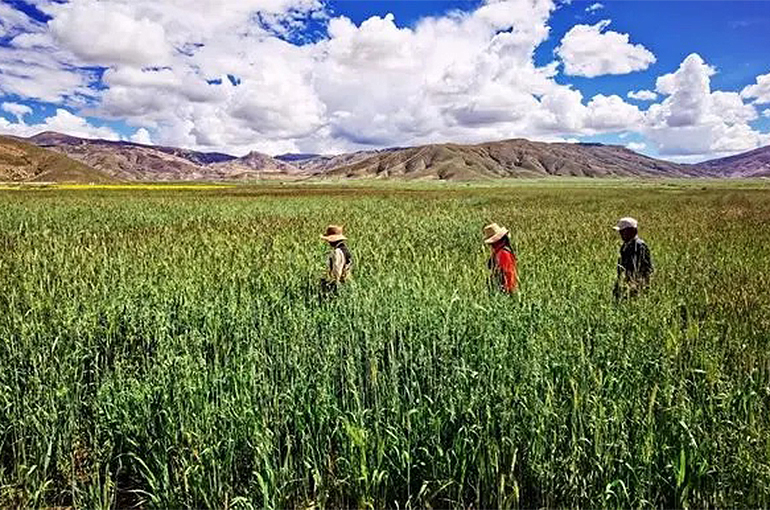 Chinese Cosmetics Firm Chando’s Grass Planting Project in Himalayas Boosts Local Economy
Chinese Cosmetics Firm Chando’s Grass Planting Project in Himalayas Boosts Local Economy(Yicai) Aug. 22 -- Chando has been heavily involved in environmental protection in the Himalayan mountain range over the past eight years where natural grasslands have been badly affected by overgrazing and climate change. The Chinese cosmetics company’s efforts not only help protect the unique Himalayan ecology, but also bring great benefits to the local economy.
Chando linked arms with the China Environmental Protection Foundation in 2016 to form the Himalayan Environmental Protection Public Welfare Fund to promote the protection of Himalayan glaciers, rare plants and animals, as well as its unique culture.
The company launched a program to plant green wheat grass, which not only helps to prevent wind and sand storms, but can also preserve water, improve soil nutrients and provide pasture land as well as employment opportunities for local herdsmen.
In May, Chando’s organization sowed 1 million square meters of green wheatgrass in Gangxi village, Lhaze county, Shigatse city in the Xizang Autonomous Region at an altitude of 4,200 meters. Four months later this has now grown into a lush field.
The area was originally a desolate desert, covered with gravel and coarse sand, said Xu Guang, director of the China Environmental Protection Foundation. Xizang, also known as Tibet, is the provincial-level region with the largest area of natural grasslands in China at 80 million hectares.
The soil is much improved after planting green wheatgrass, so after it has been harvested, local farmers can plant crops, such as potatoes, which help boost the local economy. In the past four years, Gangxi village has generated revenue of CNY1.2 million (USD168,206) and a vegetable production value of CNY6.8 million thanks to this project.
A villager called Tashi said he never thought he would see grass grow as high as a small tree at an altitude of over 4,000 meters. The farmer’s nine cows and 30 sheep, which he lets graze over 60 acres of pasture, now have enough to eat, he added.
Each household in Gangxi village has received over CNY6,400 (USD897) in income from grass planting, said Li Yunfeng, deputy governor of Lhaze county. This has hiked the annual per capita disposable income by 50 percent to CNY21,000 and this year it is expected to stay around the same level.
The Himalayan public welfare project has also created more local jobs. Through this program, companies can better communicate their ESG commitments with consumers and enhance their sense of social responsibility, Chen Juanling, general manager of public affairs of Chando, told Yicai.
Chando prepared its 2030 agenda for sustainable development this year, launching 12 sustainable development goals, including combating climate change, protecting biodiversity, as well as promoting sustainable packaging and a circular economy.
Editor: Kim Taylor